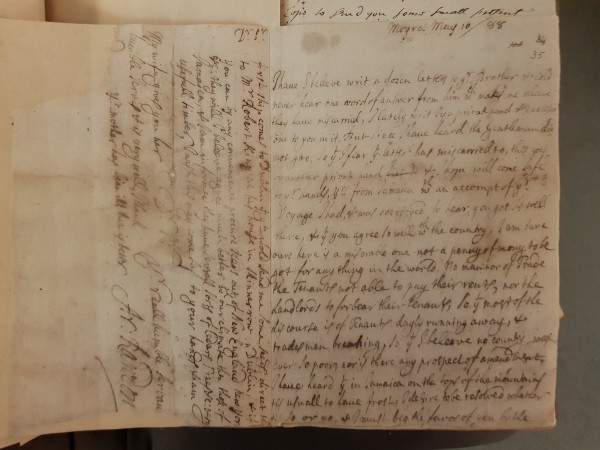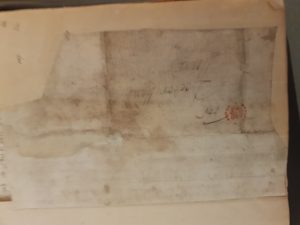f. 9
Mr Dale
London June ye 12th 1692
Sr
I recd yors of ye 18th of last month, & for answer to it can assure you
that I have seen in Jamaica what I concluded to be the cochinile
it was being ane insect exactly like it in shape colour &c & xxxx was to be found in
the furowes or sulis of the bark of the trunc of a sort of acacia I call Acacia maxima major
folijs vel spinnis minimis flore lutes odorantisims, & wch Delaet calls Species Mizquitl
quam vocavit Tzintzequam. Hernandez Mizquitl Miahuacan
enses & Ximen Mizquitl de mechoacan. I endeavoured to preserve it or use or cute it &;
that by a way wch was told me by ane Indian King who came from
Costa rica a place countrey on the Maine Continent of America whence it
comes, wch was by drying it on ane Iron plate heated, & it succeeded
soe well that I question not but that or something equivalent is the way to cure or preserve it was told me likewise
by the same person & confirmed by a Capt who had lived long in yt
place Countrey that the plants […………….] on wch the cochinile were
found were such as I found had been brought to Jam.a by a xxx with Jones[….] planted in some places [………] in
expectation of gain from that commoity, & wch I call ficus India Puna
maxima fere glabra, being in every thing like the[..][…..]
oblong protuberances or innocent green short prickles. The flours are streakd wt red, & the fruit not
soe savoury as that of the ordinary Puna. This plant was brought
thither to Jama by accident by some […..] Spanish priest who designed it for some of their own plantations […..] near this Island & affirmed to be that on a […]
was bred the cochinile but the ignorance of its culture [……………..] want
of its seed or a good & proper air climate was I suppose the occasion
of its being unsuccessfull for altho it was planted in severall places
I could never hear of any Cochinile from it tho it seems by […. …….. … ….] to be itt tonepl. I doe not in the least
question but that ’tis ane animal substance & very likely to be a
small scarabus, tho its changes & metamorphoses & I must confesse my observations as to […..] consep ye reducing it to its kind are
very defective, it requiring more nicety & time then I was willing to bestow
on it: But have been assured that of it by lying making a bed of bags of it on it [……] not well cured
much some of it took life & crept away in a great measure from to the great losse of the person who told
it me
As to ye Arbor baccifera laurifolia, aromatica fructu veridi calyculab
raceinoso described by me in the Phil. Trans. no 192, I am sure that tho it has vulgarly the[…] tis not
the true cortex Winteranus for you may see by Clusius’s description that
f. 9v
‘tis quite differing from what he calls canella alba & caspar Bauhine
makes them 2 when he gives Cinamomum sive canella tubis mineribus
alba as a name for our ordinary
[..] bark falsely called Winters bark
& Laurafolie Magellanica cortice acri for Winters Bark wch is quite another
thing. My very good friend & very ingenious
& sagacious Gentleman
Mr George Handisyd
practiser of physick who came lately from the straights of Magellan
whence Capt Winter who went with Sr Francis Drake brought his
has satisfied my curiosity
& confirmd my opinion […….] as to that matter, having
[..] brought
wt him some of the bark
leaves &c wch agrees wt Clusius’s description & wt what
he sayes of it, & tells me further that it growes as high as ane apple tree
& spreads very much both in root & branches, that is flours are pentapetalous
& milk white smelling like those of Jasmine,
to show 2 or 3
or more of them together
on ye same to stalk
to wch followes a greenish coloured berry
made up of 2 or 3
or more acini in wch lyes severall black
aromatick seeds something like the stones in grapes by wch you may see that
it
[….] is quite in all its parts differing from our common
but false cortex
Winteranus, tho I think this may be the best succedaneum wee can have for
the other wch the above praiseworthy gent. Mr Handisyd assured me was
of very great use to him in the cure of
his the people committed to his
charge of the scurvey, & sevll other distempers, & that he usd only to
boile [half a dram] in water wch wt some carminative seeds prov’d a very good
sweat, wt wch they were very much relieved & many of them cured
after eating of a poysonous sort of seal
called a sea lionthey found in these parts by
wch many of them had
[…. ……….] been so ill as to
cast loose their skins.
He likewise used the leaves
wch are like those of saurell amongst fomentation herbs in sevll cases
wt good success. I think it will be best to call it periclymenum rectum
folijs laurinus cortie aromatico. & you may easily by comparing my
description of the common Winters bark & of this from the papers
[…..] mouth & specimens of that ingenious man (who is now gone into ye
E. Indies out of curiositie) find that they are really diffeing from ye
true cinamon kind
wch is described in the H. Malub. & bears a fruit
like so ane acorn wch I have seen in Mr Charletons incomparable collection
of naturall curiosities.
As to yor Quere relating to Ebony, I believe what wee call ebony
in Jamaica is not the ebony of the Ancients
[…..] and
our ebony there is to give its
description in a name, suliquosa spinosa lyc ij folio, flore luteo papylionaceo
patulo, siliqua strictessima, lata brevi, semen oxiguum reniforine me complecsente.
f. 10
whose wood is not so black as ebony but a browner
dark color
[……] use &c. Wee have
in Jama many officinalls concerning wch you are perhaps
[……]
from other hands but if not if you please to
command desire […..] or satisfied otherwise my opinions I
shall be very ready to
doe give it, the Spainyds having been very industrious in
bringing the vegetables of one Indies to ye other by wch means I have
seen Tamarinds, Cassia Solutiva, ginger, Indico, & sevll others, besides
Guajacum,
china & many others that grew there of themselves please to give
my most humble service to Mr Ray
[…. …… … ……..] whose op=
=inion if you please to take in showing him this will be very gratefull to
me pray give him & his Lady my most humble service, I am yo
Sr Yor most humble servt
Hans Sloane
To Mr Dale



